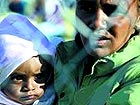| Videos | ? Latest |
|
? Feature | ? Sports | ? Your Videos |
Libya facing price soaring and food shortage

The stalemate between Libyan government forces and rebels, as well as the air attacks from other countries have no doubt badly hurt the Libyan economy. CCTV reporter takes a look at how residents in the capital Tripoli and the rebel base Benghazi are dealing.
Libyans are suffering shortages of food, water and medicine.
In the capital Tripoli, prices have soared for essentials including milk while cooking gas has become scarce. People spend hours queuing for basics.
Abubakr Ramalli, shop worker said "Something with a price of one dinar, will be for five now. Even the petrol, it was 1.5 and now it is 2 dinars."
The price hikes are especially steep because residents are stockpiling supplies for what international observers say could be weeks or months of war.
Libya is already under international trade embargoes and citizens now face shorter store hours on top of the usual difficulties. Money supply is another problem, as banks are closed and those which remain open cannot provide money.
Abubakr Ramalli said "People here have many problems to find the food. It's the same for the meat prices. As they could buy two kilograms before now, they only can buy a quarter, because there is no money. Even if people want to withdraw their money from the bank, they say no money."
The situation is not better in the rebel-held city Benghazi. Shops were shuttered. Local market traders say business activity levels in the eastern Libyan city are approaching zero.
Ahmed Zayed, shop owner said "I think you can see, all shops in the souk are closed and foreigners have been evacuated and they were a great source of economic input."
Aid is reaching Benghazi but the security situation is limiting humanitarian access further west. U.N. aid agencies say they are reviewing conditions and hope to determine the next steps in coming days.
 0
0 






